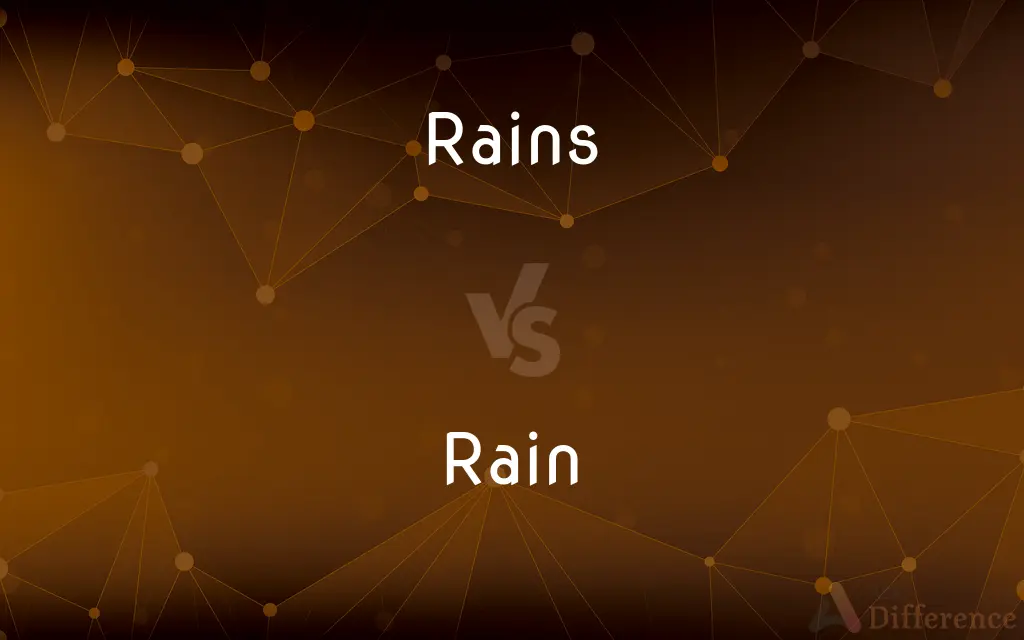Rains vs. Rain — What's the Difference?
By Maham Liaqat & Fiza Rafique — Updated on May 6, 2024
"Rains" refers to multiple instances or periods of rainfall, emphasizing variety or frequency, whereas "rain" generally denotes precipitation in the form of water droplets falling from clouds.

Difference Between Rains and Rain
Table of Contents
ADVERTISEMENT
Key Differences
"Rain" is used to describe the weather condition involving water droplets falling from the sky, typically in a singular or general sense. Whereas "rains" is used to talk about different occasions or types of rain, often across various times or in different places.
In meteorology, "rain" is a key term for the precipitation process and is used in singular form to discuss any event of rainfall, whether it's light, moderate, or heavy. On the other hand, "rains" might be used when discussing seasonal weather patterns, like the monsoon rains, which are characterized by their intensity and duration.
"Rain" can also function as both a noun and a verb in sentences, for example, "It will rain tomorrow." Whereas "rains" is used primarily as a plural noun, referring to several rainfall events or experiences.
In literature, "rain" might symbolize sadness or cleansing, applying to a specific scene or mood. Conversely, "rains" could be employed to depict ongoing or repeated scenarios, enhancing the thematic depth, such as in narratives involving enduring hardship or change.
While "rain" is often used in a broad and undefined manner, "rains" suggests a more specific context, often related to particular seasonal or recurring meteorological patterns that are noteworthy within a certain geographical area.
ADVERTISEMENT
Comparison Chart
Definition
Multiple instances or types of rain
Water droplets falling from the sky as precipitation
Usage
Plural, emphasizing frequency or variety
Singular or general precipitation event
Grammatical Role
Used as a plural noun
Used as both a noun and a verb
Contextual Use
Specific contexts like seasons, repeated or varied events
General weather descriptions, any instance of precipitation
Symbolism
Can imply persistence or change in literary contexts
Often symbolizes renewal or melancholy
Compare with Definitions
Rains
Seasonal rainfall events that occur regularly.
The annual rains are vital for the crops.
Rain
Water falling in drops from vapor condensed in the atmosphere.
The sound of rain on the roof was soothing.
Rains
Multiple instances of rain occurring.
The rains this month have been heavier than usual.
Rain
Precipitation in the form of liquid water droplets.
The rain continued throughout the day.
Rains
Varied or different types of rain observed.
The unpredictable rains can range from a drizzle to a downpour.
Rain
A single rainfall event.
A heavy rain soaked the city last night.
Rains
A series of rain events noted for their intensity or duration.
The monsoon rains flooded the coastal villages.
Rain
Any matter falling like raindrops.
A rain of arrows covered the battlefield.
Rains
Frequent rainfall characteristic of a particular region or season.
The rains in the tropics can be relentless.
Rain
The act or process of raining.
It looks like it's going to rain soon.
Rains
Water condensed from atmospheric vapor and falling in drops.
Rain
Rain is liquid water in the form of droplets that have condensed from atmospheric water vapor and then become heavy enough to fall under gravity. Rain is a major component of the water cycle and is responsible for depositing most of the fresh water on the Earth.
Rains
A fall of such water; a rainstorm.
Rain
The condensed moisture of the atmosphere falling visibly in separate drops
It's pouring with rain
The rain had not stopped for days
Rains
The descent of such water.
Rain
Rain falls
It was beginning to rain
Rains
Rainy weather.
Rain
Water condensed from atmospheric vapor and falling in drops.
Rains
Rains A rainy season.
Rain
A fall of such water; a rainstorm.
Rains
A heavy or abundant fall
A rain of fluffy cottonwood seeds.
A rain of insults.
Rain
The descent of such water.
Rains
To fall in drops of water from the clouds.
Rain
Rainy weather.
Rains
To fall like rain
Praise rained down on the composer.
Rain
Rains A rainy season.
Rains
To release rain.
Rain
A heavy or abundant fall
A rain of fluffy cottonwood seeds.
A rain of insults.
Rains
To send or pour down.
Rain
To fall in drops of water from the clouds.
Rains
To give abundantly; shower
Rain gifts.
Rain curses upon their heads.
Rain
To fall like rain
Praise rained down on the composer.
Rains
Plural of rain
Rain
To release rain.
Rains
A rainy season; monsoon
The rains came early this year.
Rain
To send or pour down.
Rain
To give abundantly; shower
Rain gifts.
Rain curses upon their heads.
Rain
Condensed water falling from a cloud.
We've been having a lot of rain lately.
The rains came late that year.
Rain
(figuratively) Any matter moving or falling, usually through air, and especially if liquid or otherwise figuratively identifiable with raindrops.
Rain
(figuratively) An instance of particles or larger pieces of matter moving or falling through air.
A rain of mortar fire fell on our trenches.
Rain
(impersonal) To have rain fall from the sky.
Judging by the black cloud, it will rain later today.
Rain
(intransitive) To fall as or like rain.
Tears rained from her eyes.
Leaves rained from the tree.
Bombs rained from the sky.
Rain
(transitive) To issue (something) in large quantities.
The boxer rained punches on his opponent's head.
Rain
Reign.
Rain
Water falling in drops from the clouds; the descent of water from the clouds in drops.
Rain is water by the heat of the sun divided into very small parts ascending in the air, till, encountering the cold, it be condensed into clouds, and descends in drops.
Fair days have oft contracted wind and rain.
Rain
To fall in drops from the clouds, as water; - used mostly with it for a nominative; as, it rains.
The rain it raineth every day.
Rain
To fall or drop like water from the clouds; as, tears rained from their eyes.
Rain
To pour or shower down from above, like rain from the clouds.
Then said the Lord unto Moses, Behold, I will rain bread from heaven for you.
Rain
To bestow in a profuse or abundant manner; as, to rain favors upon a person.
Rain
Water falling in drops from vapor condensed in the atmosphere
Rain
Drops of fresh water that fall as precipitation from clouds
Rain
Anything happening rapidly or in quick successive;
A rain of bullets
A pelting of insults
Rain
Precipitate as rain;
If it rains much more, we can expect some flooding
Common Curiosities
Is "rains" a common term in weather forecasting?
Yes, "rains" is commonly used in weather forecasting when discussing patterns or predictions over a period.
What is the main difference between "rain" and "rains"?
"Rain" refers to precipitation generally, while "rains" refers to multiple or frequent occurrences of rain, often in a specific context.
What grammatical role does "rain" serve in a sentence?
"Rain" can serve as both a noun and a verb, whereas "rains" is used as a plural noun.
How does "rain" interact with other weather elements?
"Rain" interacts with elements like wind and temperature, affecting its intensity and duration.
How are "rains" significant in agriculture?
"Rains" are crucial in agriculture, especially in regions dependent on seasonal rains for growing crops.
What does "rain" symbolize in literature?
In literature, rain often symbolizes cleansing, renewal, sadness, or a change in mood.
How do "rain" and "rains" compare in terms of their impact on the environment?
Both terms describe environmental impacts, but "rains" often implies broader or more significant effects due to frequency or volume.
Can "rain" and "rains" be used interchangeably?
They are not typically interchangeable as "rain" is singular and "rains" plural, implying multiple events.
Why might someone refer to "rains" instead of "rain"?
"Rains" might be used to emphasize the regularity, variety, or intensity of rainfall events.
Which term is used more frequently in everyday conversation?
"Rain" is more commonly used in everyday conversation for general references to precipitation.
How do cultural perceptions of "rain" and "rains" differ?
Cultural perceptions can vary, with some cultures seeing rain as a blessing and others as an inconvenience; "rains" might be particularly welcomed or dreaded depending on agricultural reliance.
What are some common phrases involving "rain"?
Common phrases include "rain check", "it's raining cats and dogs", and "right as rain."
Does the use of "rain" or "rains" differ by region?
Yes, the usage can vary by region, especially in areas with distinct wet and dry seasons where "rains" might be more prevalent.
Can "rains" refer to anything other than weather?
While typically weather-related, "rains" can metaphorically describe any frequent or numerous occurrences.
What kind of weather patterns are associated with "rains"?
"Rains" are often associated with seasonal patterns, like monsoons or prolonged wet seasons.
Share Your Discovery

Previous Comparison
Brutal vs. Cruel
Next Comparison
Okay vs. SureAuthor Spotlight
Written by
Maham LiaqatCo-written by
Fiza RafiqueFiza Rafique is a skilled content writer at AskDifference.com, where she meticulously refines and enhances written pieces. Drawing from her vast editorial expertise, Fiza ensures clarity, accuracy, and precision in every article. Passionate about language, she continually seeks to elevate the quality of content for readers worldwide.
















































